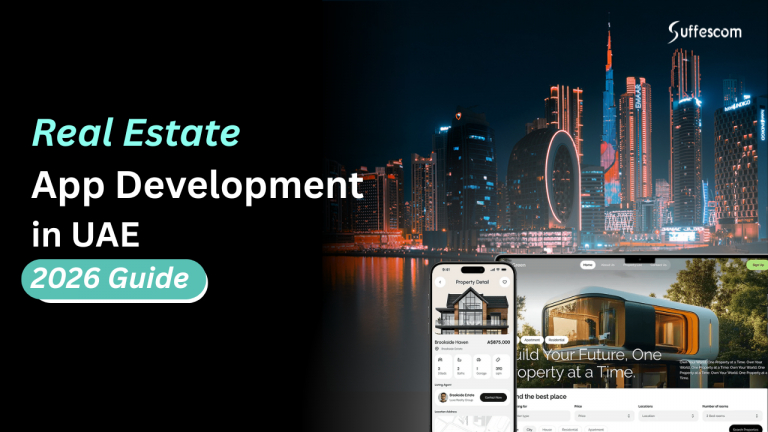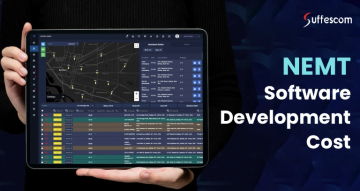Real Estate / Proptech App Development in UAE: 2026 Guide

Key takeaways:
- The global real estate software market is projected to reach $21,766.9 million by 2030, making now the ideal time to invest in a real estate app.
- Over 95% of Dubai property seekers search online, driving demand for AI, AR/VR, and PropTech-powered apps.
- The real estate app development process follows clear stages including discovery, design, development, testing, launch, and ongoing maintenance.
- Real estate apps must include smart search, virtual tours, CRM tools, and DLD/Ejari integrations to succeed in the UAE market.
- Development costs in Dubai typically range from AED 30,000 to AED 110,000+, depending on features, complexity, and technology.
Want the best-in-class Real Estate Proptech App? → Get a Free Quote
Have you ever thought about how real estate apps are simplifying the cluttered market to help find the dream home in Dubai? The demand for real estate app development has increased due to the desire for ease among buyers, agents, and tenants.
Additionally, according to a recent report from Grand View Research, the global real estate software market is anticipated to reach $21,766.9 million by 2030. This isn't just a number but a golden opportunity for businesses to enter this booming market now. However, developing a real estate app in Dubai isn't only about property listings and home searches; it also involves providing a smooth user experience and easing the traditional process.
With the market expanding at this rate, the next step is clear: knowing what it takes to build a real estate app for Dubai, covering features, costs, and other important aspects. This guide will assist you through it all.
Start Your Real Estate App Project Today!
Why Do UAE Businesses Need a Real Estate \ PropTech App?
The main reason UAE businesses need a real estate app is simple: the market is evolving rapidly with modern technologies. For instance, the integration of AI in real estate is rising, as according to a report, it can automate 37% of tasks. But if you are still in confusion about how a real estate app can improve your business operations, here are a few reasons you should definitely consider.
Rising Demand for Digital Property Search
More than 95% of Dubai property seekers now begin their search online. A custom real estate app places your business right where buyers, tenants, and investors are actively looking, increasing visibility and lead generation.
PropTech Revolution
There is a huge demand for integrating modern technologies into proptech or real estate apps. Besides AI, the next is AR/VR, as it allows users to easily navigate a property without the hassle of going all around town.
Increasing Revenue
You can integrate different revenue models in your real estate app, and they each will offer a distinct method of earning revenue. Through a set of monetisation practices, you will be able to increase the likelihood of profitability in the business.
Improved Customer Engagement
An engaged user in your real estate app is more likely to refer other users to the application, thereby becoming more engaged. Characteristics such as internal chat, notification of new listings, and market notifications will assist in keeping the consumers engaged with your app.
By investing in real estate app development in Dubai 2026, you can expand to a whole new level. Creating a real estate app is not an extra expense but a pathway that drives growth and revenue.
Types of Real Estate Apps You Can Build
When you decide to create a real estate app in UAE, it's not limited to just property browsing, as there are many other types of real estate apps, each solving a specific operational gap. Let’s explore some of the main types.
Property Marketplace App
A property marketplace app enables businesses to centralise all their listings and attract high-intent buyers or renters who prefer digital-first exploration. In fact, a report states that 75% of homebuyers aged 24 to 42 use mobile apps to search for properties.
Therefore, developing a real estate marketplace app will increase lead flow and position the businesses as a top discovery hub in the UAE real estate market.
Examples: Property Finder, Bayut
Brokerage and Agency App
Various brokerages and agencies benefit from a real estate app because it simplifies main processes like property uploads, client communication, and lead management. Instead of handling the data in a spreadsheet or WhatsApp, brokers can use a unified real estate platform with CRM integration to monitor pipeline activity and respond faster.
This directly helps in increasing sales velocity and decreasing operational loads for agencies. A custom real estate agency app also boosts brand presence, improves professional communication, and provides analysts with clear performance insights.
Examples: Allsopp App, Betterhomes CRM App
Rental and Leasing App
Another type of real estate app that you can create is a rental and leasing app that helps businesses automate recurring rental operations and reduce paperwork-related workflows. Tenants can easily renew contracts, make monthly payments, and track timelines without manual follow-ups.
Moreover, for landlords and property managers, this will decrease administration effort, guarantee timely rent collection and improve tenant experience.
Examples: RentMyStay, JustRent
Real Estate Investment App
Real estate investment apps help businesses attract local and international investors by providing fractional ownership and ROI projections. If you are aiming to tap into the growing investment industry in Dubai, then this type of real estate will open a fresh revenue stream for you. The ability to show verified opportunities and structured plans will help in creating investor confidence.
Examples: Stake, SmartCrowd
Smart Property Management App
Creating a smart property management app for your business workflow will help in improving efficiency by centralising maintenance requests, IoT-based asset communication, and more. This type of PropTech app is best for property developers and landlords who handle various units. So, with property management app development, businesses can improve service quality and reduce response time.
Examples: Ejari App, MySyara Property Management App
Get a quick quote in under 24 hours with a tailored scope and timeline.
Top Features That You Must Incorporate in Your Real Estate\ Proptech App
If you want your real estate app to be unique in the UAE market, it needs more than attractive property photos. It needs features that keep users engaged and help them find their dream properties smoothly. Let’s explore the essential features every real estate app should include:
User Panel Features
Search Functionality
Everyone starts with the search bar. If users can’t find properties fast, they’ll disappear faster than a villa listing in Palm Jumeirah. A smart search lets users filter out the location, price, RERA ID, and community, and only relevant results appear instantly.
Advanced Filters
Filters refine results with details like furnishing status, number of bedrooms, amenities and developer name. The more precise the filters, the easier it is for users to reach the right property.
Virtual Property Tours
360-degree and AR tours help users explore homes remotely with clarity. This is especially useful for overseas buyers and busy professionals evaluating Dubai properties.
Saved Properties
Users can shortlist and revisit properties anytime, anywhere, which makes the decision-making process more organised and efficient.
Interactive Maps
With this feature, users can check schools, malls, beach access, public transport, and very importantly, traffic. The map shows everything, so they can decide if the neighbourhood actually matches their lifestyle.
Instant Alerts and Notifications
Updates for new listings, price changes, viewing reminders, and community news keep users informed and engaged without overwhelming them.
In-App Chat
A built-in messaging system allows users to communicate with agents instantly, request details and schedule visits without switching apps.
Integrated Mortgage Calculators
By integrating this feature in the Proptech solution, users can easily calculate EMIs, interest, affordability, and payment timelines.
Agent App Features
Property Listings Management
Agents should be able to upload new listings faster. Simple uploads, quick edits, and organised galleries keep the pipeline flowing without issues.
Integrated CRM
A central CRM helps agents manage leads, track conversations, assign follow-ups, and maintain a clear view of their pipeline.
Performance Analytics
With a feature that helps preview insights into listing views and conversions, help agents know what is attracting clients and where exactly enhancements are required.
Appointment Management
A scheduling tool allows agents to organise property viewings efficiently and avoid overlapping appointments.
Document Management
Agents can upload and share floor plans, ownership documents, and brochures directly through their panel, speeding up communication.
Earnings Tracking
Agents can track their commissions, payouts, and performance metrics in an organised and transparent way.
Admin Panel Features
Centralised Dashboard
The admin gets complete visibility of users, agents, listings, transactions and platform performance from one unified dashboard.
Billing and Payment Management
Admins can monitor subscriptions, premium listings, commissions and all transaction records through a controlled billing workflow.
KYC and Verification
Identity verification ensures that agents, landlords and users are legitimate, maintaining trust and platform integrity.
Property Moderation
Admins approve, reject, refine, and maintain quality control. This is how the real estate app stays credible and Google-friendly.
Role-Based Access Control
Incorporate a feature in your real estate app where there are different permissions levels for admins and managers to guarantee an organised operational structure.
Marketing Tools
Admins can promote featured listings, launch internal campaigns and highlight important property updates across the app.
Turn These Features Into Your Custom App
AI, AR, and Compliance Features Essential for UAE Real Estate \ PropTech Apps
AI Recommendation Engine
With an AI recommendation engine integrated in a real estate app, the system suggests properties that users will like based on their past searching preferences, like Netflix. This feature improves discovery and engagement.
AI Chatbot Support
With AI chatbot assistance, users can easily get answers to their queries and receive property suggestions.
Automated Valuation Models
Fastly estimate valuations based on trends of the market and historical data with AI in real estate. It helps users make the right decision about their dream property.
Smart Lead Scoring
Machine learning identifies serious users and ranks leads so agents can prioritise accordingly.
AR Visualisation
Augmented reality tools let users see their future home before it’s built, including its interiors, furniture placement and space layouts.
Fraud Detection
AI detects suspicious activity, duplicate listings and abnormal patterns to maintain a secure marketplace.
Ejari Integration
The app can support digital rental contract creation and registration fully aligned with Dubai’s Ejari system.
DLD API Integration
Connectivity with the Dubai Land Department ensures access to verified title deeds, property data and transactional information.
Digital Contracts
Secure digital agreements streamline the sales and rental process while maintaining compliance-ready workflows.
Escrow-Style Payments
A controlled payment structure ensures safe and transparent transactions, especially important for high-value Dubai properties.
Top 5 Popular Real Estate \ PropTech Apps Booming in UAE
1. Property Finder
Property Finder is a top real estate app in UAE, showing users properties for rent or sale, along with features like a mortgage calculator. Recently, it introduced the 'super agent' feature, which ranks agents to help users find the most suitable one.
2. Bayut
An app like Bayut in the UAE helps users find properties in their preferred neighbourhood using features similar to a 3D virtual tour app. With functionalities like Trucheck, which guarantees that the listed property is in the same condition, and Truestimate, which provides up-to-date value estimates, it makes Bayut the leading real estate app in the UAE.
3. Makani
A real estate app like Makani helps users locate various properties geographically. The app is widely used in cities such as Dubai, Ajman, and others. The Makani app includes features like searching for properties via voice commands, multi-language support, offline functionality, and more.
4. Dubizzle
Another popular real estate app is Dubizzle, recognised for its listings and adverts for buying and selling property in Dubai. In Dubizzle, users can also rent or sell anything besides properties, which makes it even more appealing for users in the UAE.
5. Dubai REST
The Dubai REST app, launched by the Dubai Land Department, is meant to streamline and computerise transactions. It enables one to scan documents and confirm property ownership, which is both in compliance with RERA and secures all transactions.
Also Read: Cost to Develop Real Estate App Like Dubai Rest
All these are popular real estate apps in UAE that hold a significant share of the real estate app market. If you want to create a real estate app, analysing these competitors is crucial to develop a real estate app that not only outperforms them but also offers a unique value proposition.
Step-by-Step Real Estate App Development Process
To create a real estate app in Dubai requires a structured path, just like guiding buyers from the initial inquiry to the final property list. Each phase adds clarity and takes your real estate app to a smooth launch. Let’s discuss the phase-wise real estate app development process.
1. Discovery & Research
This is your groundwork phase, where ideas turn into direction.
- Conduct market analysis to know user demand, trends, and regulatory requirements.
- Analyse competitors to find their strengths and where their apps have gaps that can be fulfilled with your features.
- Build user personas to clarify goals and core user needs that need to be fulfilled with your real estate app.
- Based on the research insights and your business objectives, our real estate app developers prioritise features.
Outcome: A product brief, feature list, and a roadmap that sets the tone for the entire proptech app development project.
2. Wireframing & UX/UI Design
Here, our real estate app development constructs concepts that become visual structures and workflows.
- Create low-fidelity wireframes with tools such as Miro, Whimsical or Figma (low-fi mode) to organise the screen layouts.
- Develop user journeys for functionalities like search, listing exploration, bookings, and profile management using Miro, FigJam, or Overflow.
- After approval, change wireframes into high-fidelity UI designs with clean and intuitive layouts in Figma, Adobe XD or Sketch.
- Our real estate developers UAE build a design system with typography, colours, icons, and reusable components using Figma Design System Libraries, Sketch Libraries or Zeroheight.
Outcome: Interactive prototypes ready for validation and going forward to real estate app development.
3. Development (Frontend, Backend, APIs)
This is where the real estate app actually takes shape, technically based on the vision you have in mind.
- Frontend developers create screens for iOS, Android, or web (user-facing).
- The backend developers develop business logic, authentication modules and databases.
- Build APIs to enable all the modules (frontend, backend, integrations) to communicate.
- Add requisite functions, such as maps, payment systems, messaging, CRM and analytics.
Outcome: Working app builds with connected functionality and documented APIs.
4. Testing & QA
Once the app is developed, it is tested to ensure it works exactly as intended. Our real proptech app development company conducts:
- Unit testing to check individual components and modules.
- Integration testing to validate flows between APIs and services.
- End-to-end testing to simulate real user journeys.
- Security, performance, and load testing.
- UAT to gather feedback from real users or internal stakeholders.
Outcome: A stable bug-free version ready for launch.
5. Launch & Deployment
In this critical step, the real estate app is finally deployed. Key workings include:
- Prepare App Store and Play Store listings with screenshots and descriptions.
- Configure cloud hosting, CD pipelines, and domain settings for web-based versions.
- Perform a soft launch or phased rollout to reduce risk before a full-fledged deployment.
- Monitor analytics, crashes, and early usage behaviour.
Outcome: A live app, available for download and ready for real-world feedback.
6. Maintenance & Scaling
Post-launch of the real estate app is an ongoing journey where the app is maintained. It includes:
- Monitor app performance, user engagement, and technical health.
- Release periodic features, bug fixes, and security patches.
- Optimise databases, add caching and add capacity to cloud resources as traffic increases.
- Add capabilities based on user feedback and market shifts.
Outcome: A continuously evolving app that grows with your business.
Also Read: Step-by-Step Guide to Develop a Virtual Property Tour App
Ready to follow this proven development process for your own real estate app?
Advanced Tech Stack to Build a Real Estate\ PropTech App
Selecting the right technology stack is an important aspect in real estate/ proptech app development because a suitable tech stack will guarantee your real estate platform is fast and secure. So, if you are thinking to develop a real estate auction app or a property management software, picking the right technologies and frameworks can define the triumph of your solution.
Frontend & Backend Technologies
Frontend and backend technologies define how your real estate app will look and perform. The technologies that are used for real estate app development in Dubai are:
Frontend (User Interface & Experience)
- Flutter: A Single codebase for iOS & Android to give fast performance and native-like UI.
- React Native: Best for adaptable real estate apps with smoother animations.
- TypeScript: Enhances code reliability and decreases app crashes.
- Swift/Kotlin: To develop native real estate apps for iOS (Swift) and Android (Kotlin).
But you can use Swift for Android app development through tools such as Skip, and similarly, you can develop iOS apps with Kotlin using Kotlin Multiplatform (KMM).
Backend (Logic, APIs & Data Processing)
- Node.js: Used for instant processing, best for features like property updates.
- Python / Django: Preferred for AI integration and data-heavy applications.
- MongoDB / PostgreSQL: Used to manage large volumes of data of property listings, geo-spatial data handling, and more.
- GraphQL: Quicker data fetching, great for maps, filters, and search results.
Third-Party API Integrations
API integrations in your real estate app can increase the capabilities and make the property journey more reliable for users.
Standard Integrations in Dubai Real Estate/Proptech Apps:
- Payment Gateways (PayTabs, Telr, Stripe): Incorporated for secure rent or booking payments.
- Map & Location APIs (Google Maps, Mapbox): Integrated for geo-tagged listings and neighbourhood insights (requires backend handling of coordinates).
- CRM Integrations (HubSpot, Salesforce, custom CRMs): Centralised lead and agent management.
- Dubai Land Department (DLD) API: Incorporated for instant property verification, Ejari services, and transaction validation.
- SMS/Email Gateways: To push alerts for booking, document tracking, and other important notifications.
Cloud & Security Infrastructure
High availability and security compliance are very important for any real estate app due to Dubai's regulated guidelines.
Cloud Platforms:
- AWS (Amazon Web Services): For auto-scaling, multi-region deployment, and strong security.
- Microsoft Azure: Best for enterprise-grade real estate app development.
- Google Cloud: Best for heavy AI real estate apps.
Security Protocols:
- GDPR Compliance: Protects user data and personal information.
- RERA-Aligned Workflows: Guarantees compliance with Dubai real estate regulations.
- End-to-End Encryption: Safeguards and secures user communication and transactions.
- Biometric & Multi-Factor Authentication: Increases login security in the real estate app.
AR/VR for Virtual Tours
AR/VR technology is now a must for real estate apps because it provides property and nearby exploration, which is beneficial for overseas buyers and tenants.
- Apple’s ARKit or Google’s ARCore: To create immersive experiences of 3D visualisation in the real estate app.
- Unity 3D: Best for creating interactive virtual tours and 3D walkthroughs.
- Three.js: For web-based 3D models, AR previews, and interactive visualisations.
- SketchUp / Blender: To create detailed 3D models, interiors, and spatial layouts before integrating into the real estate app.
Real Estate App Development Cost in UAE
When you choose to develop a real estate app for the UAE market, it is important to consider not only the development process and technology stack but also the cost. The real estate app development cost depends on the app type and audience. Let’s discuss further:
| Type of Real Estate App | Estimated Budget (AED) | Audience |
| Agent App | AED 30,000 – AED 45,000 | Independent Brokers & Small Teams |
| Property Listing Marketplace | AED 55,000 – AED 90,000 | PropTech Startups & Online Portals |
| Real Estate Enterprise Platform | AED 70,000 – AED 100,000 | Large Real Estate Enterprises & Developers |
| Rental & Tenant Management Apps | AED 55,000 – AED 70,000 | Landlords, PMS Firms & Co-living Companies |
| Virtual Property Tour App | AED 85,000 – AED 110,000 | Luxury Developers & International Buyers |
| Real Estate CRM Platform | AED 70,000 – AED 90,000 | Sales Teams, Developers & Agencies |
| AI Real Estate Brokerage Software Development | AED 44,000 – AED 85,000 | Brokers, Renters & Investors |
| Property Management Software Development | AED 25,000 – AED 60,000 | Landlords, Property Owners & Rental Handling Agencies |
| Real Estate Fractional Ownership Platform | AED 35,000 – AED 55,000 | Individual Investors & Wealth Management Firms |
| Real Estate Tokenization Platform Development | AED 45,000 – AED 105,000 | High-Net-Worth-Individuals (HNWIs) & Investment Firms |
Factors Influencing the Cost to Develop a Real Estate \ Proptech App
Moving forward, let’s explore the factors that influence the real estate app development cost in UAE.
1. App Complexity
Deciding on the complexity of the real estate app will help budget accordingly, as real estate apps of different complexities cost differently. Let’s discuss each app's complexity:
Basic Real Estate Apps
Basic real startups only come with essential features and inquiry functionalities. It is best for startups as it costs less.
Mid-Level Real Estate Apps
Mid-level real estate apps cost more than basic ones because these real estate apps integrate features like analytics, automation, and custom UI/UX. It is best for scaling businesses.
Advanced Real Estate Apps
This type of real estate app costs the highest to develop because it comes with AI chatbots, AR/VR virtual tours, or MLS integration. This type of real estate app is best for large enterprises.
Real Estate App Development Cost Based on Complexity
| Complexity | Features | Cost Range (AED) | Timeline |
| Basic Real Estate App | Basic features, simple admin, 1 platform | AED 30,000 – AED 55,000 | 1 – 3 months |
| Mid-Level Real Estate App | Advanced features, CRM, payments, strong UI, 2 platforms | AED 55,000 – AED 80,000 | 3 – 6 months |
| Advanced Real Estate App | Marketplace, AI integration, automation, AR/VR, custom backend | AED 80,000 – AED 110,000+ | 6 – 10 months |
2. App Features
Real Estate app features also affect the cost to build a real estate app. Basic features like contact forms and property photo galleries cost less and keep development simple, whereas advanced features like a dynamic pricing engine and CRM tools require a complex AI model and resources, which increase the overall real estate app development cost.
3. UI/UX Design
The UI/UX design of a real estate also impacts the cost, as good design provides better usability and inclusivity. Moreover, the real estate app should support RTL (Right-to-left) and LTR (Left-to-right) layouts, with responsive UI and navigation, which in turn increases real estate app development cost UAE.
4. Platform Choice
The selection of the platform also affects the real estate app development cost, as creating an app for one platform (iOS or Android) is cheaper compared to developing an app for both. With cross-platform app development, you can develop for both platforms, which also reduces the app development cost.
5. App Development Choice
Your real estate app development company selection also impacts the cost, as hiring a team locally will bring local market knowledge, but it is more costly. Additionally, offshore app development teams can develop the project in less time but might require more time to oversee the project.
6. Post-Launch Support
When the real estate app is launched, ongoing and post-launch services are required to maintain the app, and these post-launch services are not a one-time cost but a yearly expense. Keep 15-20% of the total real estate app development cost for post-launch support.
Also Read: How Much Does It Cost To Develop Web3 Real Estate?
Cost Optimisation Strategies for Real Estate App Development
Small differences in choices during real estate app development UAE can help in major savings. Let’s discuss some strategies that you can apply at each stage.
1. Prioritise a Focused MVP
Begin with MVP app development, where only the required features are developed. This helps in faster time-to-market and getting feedback from users before full investments.
2. Automate Testing and CI/CD Early
To optimise the cost of real estate app development, set up automated unit tests and integration tests with deployment pipelines. It helps in reducing manual QA time and errors.
3. Release Features Incrementally with Feature Flags
Roll out small segments first and then toggle the features of a real estate app as needed. It lowers risk and simplifies rollbacks.
4. Outsource Real Estate App Development
Partner with a company in the UAE that offers custom real estate app development services aligned to your needs and vision. Additionally, outsourcing is more cost-effective than developing the app in-house.
5. Plan for Maintenance and TCO
From the start, budget for updates, security patches, and monitoring. It helps in reducing higher long-term expenses.
Real-World Case Studies: How Much Real Estate Apps Actually Cost
Dubai Brokerage App
A large brokerage firm in Dubai needed an agent app with lead tracking, AI chatbot support, and DLD integration. The real estate app project covered UI/UX, APIs, and agent dashboards and was delivered within 12 weeks on an AED 100k budget.
Property Marketplace App
A UAE PropTech startup required a complete property marketplace with map-based listings, AI recommendations, and multi-role access. The build included backend architecture and CRM tools, completed for AED 120k.
Property Management SaaS
One of the top property management firms needed a SaaS platform for rent collection, tenant onboarding, and digital contracts. The solution included web and mobile apps, financial automation, and cloud deployment, costing AED 150k.
Profitable Revenue Models for Real Estate & PropTech Apps
Selecting the appropriate revenue model for your real estate app is like picking the right property. Let’s discuss each type of revenue model that you can integrate into the real estate app to boost your earning flow.
Commission Model
The commission model is a revenue stream that works just like a real estate agent, earning a fee after a deal closure, which means the real estate app earns a percentage when a property is sold, booked, or even rented. This model is based on no-deal, no-fee.
How to do it right:
- Set transparent commission rates.
- Track transactions accurately to avoid any problems.
- Give agents and sellers tools that boost conversions.
Subscription Model
In this type of revenue model, the app earns revenue through monthly memberships taken by real estate companies. Everyone, from agents to property managers, pays a recurring fee to use the premium feature, like advanced analytics and CRM tools.
Tips to make it work:
- Create plans so users can pick which tier will fit their requirements.
- Provide a free trial or basic plan to attract users.
- Keep adding value to justify the recurring fee.
Featured Listings / Ads
This revenue model is kind of the same as promoting something, as in this model type, sellers pay extra to increase their visibility and show at the top of search results. It's a great option in markets where competition for buyer attention is more.
How to do it right:
- Keep the featured section limited so it remains valuable.
- Provide different ad formats like banners or city-specific highlights.
- Show performance insights so advertisers know where their money went.
Transaction Fee Model
Besides the percentage-based commission, the real estate app can earn through a fixed fee for each transaction, like a small service charge, or when booking a property tour or short-term vacation stay.
How to do it right:
- Keep fees small and clearly visible from the beginning.
- Bundle value like secure payments or fast confirmations, to justify the charge.
- Guarantee payment integrations are smooth and reliable.
Property Management Services
Here, your real estate app becomes more than a listing platform, it becomes a digital assistant for tenants and landlords. In this revenue model, you can offer paid services, like maintenance scheduling and tenant screening.
How to do it right:
- Focusing on convenience and automation should reduce workload, not add to it.
- Provide landlords with dashboards to track everything.
- Add optional paid upgrades like premium maintenance support or verified contractor services.
How to Choose the Right Real Estate App Development Company
To create a unique and distinguished real estate app in the market, it is important to collaborate with a leading real estate app development company in the UAE like Suffescom, that offers the best real estate app development services. Here are a few points to consider when collaborating with an app development company in UAE.
1. Technical Expertise
Choose a real estate app development partner that has experience in various technologies, AI integration, and frameworks and has a balanced team of developers, designers, and project managers.
2. Past Real Estate Projects
Review their past work in PropTech property marketplaces, rental platforms, PMS systems, brokerage apps, AR/VR tools, and smart lead management systems. Proven experience means faster delivery and fewer development risks.
3. UAE Compliance Knowledge
Search for a reputable and experienced custom real estate app development company in UAE with extensive expertise in compliance and regulations, including AML and the UAE Central Bank rules.
4. Ability to Integrate Modern Features
Look for a company that can smoothly integrate features like AI recommendations, AR tours, valuation engines, smart contracts, and payment solutions matched according to Dubai’s real estate market.
5. Strong UI/UX Capabilities
A great real estate app must be simple and visually compelling. Ensure the real estate app development agency prioritises mobile responsiveness and conversion-focused design.
6. Transparent Communication & Process
Select a real estate app development service provider that employs agile methodologies, offers weekly updates via tools like Jira and Trello, and provides clear timelines and transparent costs.
7. Post-Launch Support & Scalability
Select a company that gives continuous support, security monitoring, feature upgrades, and performance optimisation, as real estate requires continuous maintenance to evolve with the market.
Conclusion
Developing a real estate app in UAE is among the most intelligent moves a business can make at the moment. By meeting buyers' demand for quick searches, virtual tours, artificial intelligence support, and verified information, a digital platform enables you to satisfy modern requirements and drive efficiency, engagement, and revenue.
As the UAE real estate field is still growing, the selection of the right real estate app development company makes sure that your app is reliable, can be scaled, and is indeed competitive. With the proper functionality and partner, you can create a robust real estate app that promotes long-term business success in Dubai.
Discuss Your PropTech Idea with Our Real Estate App Development Company!
FAQs
1. Why is PropTech app development booming in the UAE in 2026?
Ans. PropTech app development in UAE is booming because investors, developers, and buyers demand smart property solutions, AI-driven insights, and seamless digital transactions. With Dubai’s push for real estate digital transformation, mobile platforms help streamline property search, verification, and investment. These trends make PropTech trends UAE a leading force in the global market.
2. How much does it cost to develop a real estate or PropTech app in the UAE?
Ans. The real estate app development cost in UAE typically ranges from AED 30,000 to AED 110,000+, depending on features like AI recommendation systems, AR property viewings, and secure payment integrations. The rise of UAE property management systems and high-quality UX standards adds to the budget.
3. What features are essential for a modern UAE real estate app in 2026?
Ans. A modern app should include features like:
- AI property advisor
- AR/VR tours
- RERA integration
- Automated KYC
- Smart contracts
- Property valuation tools
- Multi-language support.
4. How does AI improve real estate app performance in the UAE?
Ans. AI improves real estate app performance by delivering:
- Personalized property recommendations
- Dynamic pricing insights
- Fraud detection
- Automated lead management
5. Do I need to integrate RERA compliance features in my PropTech app?
Ans. Yes, RERA integration builds trust by enabling verified listings, ownership checks, transparency tools, and secure transactions. It’s now a standard expectation in UAE property management systems and modern real estate digital transformation projects.
6. How important are AR and VR property tours for UAE real estate apps?
Ans. AR/VR property tours are crucial in 2026 because expats and investors prefer remote viewing experiences. These immersive tools increase engagement and align with PropTech trends UAE and luxury property marketing expectations.
7. What types of PropTech apps are trending in the UAE?
Ans. Popular proptech app types include:
- Property marketplace apps
- Rent management platforms
- AI valuation apps
- Smart home integration platforms
- Fractional investment apps
8. How long does it take to build a real estate or PropTech app in the UAE?
Ans. The time taken to build a real estate or PropTech app in UAE takes between 3–9 months, depending on complexity, features, and the need to integrate smart property solutions like IoT, blockchain, and AI automation.
9. Why should I build my real estate app specifically for the UAE market?
Ans. The UAE offers unmatched digital infrastructure, government support, and a tech-driven real estate ecosystem. Tailoring your app for Dubai real estate technology standards ensures competitive advantage.
10. Can a PropTech app help automate property management?
Ans. Yes, modern UAE property management systems automate rent collection, maintenance requests, tenancy renewals, and inspections. AI and chatbots enhance efficiency, reducing manual work.
11. How does blockchain benefit real estate apps in the UAE?
Ans. Blockchain supports smart contracts, secure payments, asset tokenization, and transparent transactions. These tools are essential to 2026 real estate digital transformation standards.
12. What role does multilingual support play in UAE real estate apps?
Ans. Arabic and English are essential, but adding more would increase accessibility for investors. This enhances user experience and boosts property marketplace features for global buyers.
13. How can my PropTech app attract more property buyers and renters?
Ans. Yes, your PropTech app can attract more buyers and renters through the use of AI-powered recommendations, geolocation tools, AR tours, verified listings, and fast search filters.
14. Should my real estate app include digital payment options?
Ans. Yes, UAE users expect ESCROW payments, credit card gateways, Apple Pay, and crypto options. These integrations align with modern Dubai real estate technology and secure investment flows.
15. Can I integrate smart home devices into my PropTech app?
Ans. Absolutely. IoT integrations allow users to control lighting, climate, security, and utilities. Such smart property solutions increase the app’s value for luxury property markets.
16. How do I choose the best development company for a PropTech app in the UAE?
Ans. Look for a team experienced in AI real estate apps, RERA compliance, AR/VR development, and data security. Ensure they understand PropTech trends UAE and can scale the app for future growth.







